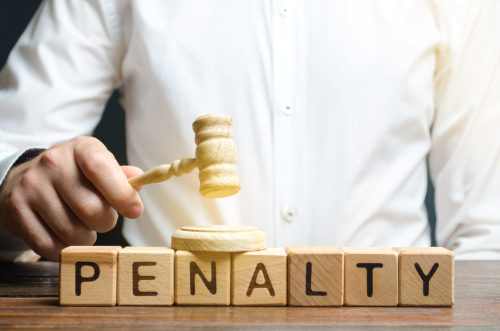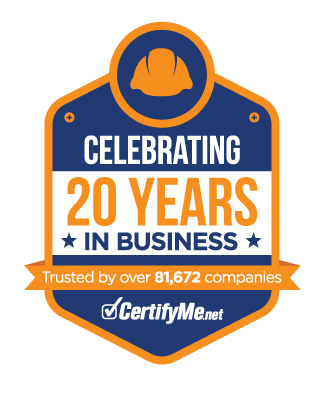Your Guide to OSHA Recordkeeping Requirements

Does your company need an OSHA recordkeeping class? Ask yourself these questions first:
- Do you find it difficult to keep up with OSHA recordkeeping requirements?
- Do you wonder if you are doing it right – or all wrong?
- Do you wish you had straightforward, compliant, OSHA recordkeeping training?
- Do you wish you did not have to learn about OSHA recordkeeping the hard way?
If you answer yes to any (or all) of these queries, an OSHA recordkeeping course will help you organize, streamline, and improve your overall safety program.
CertifyMe.net offers an “OSHA Recordkeeping for Managers and Supervisors” course that covers all the basics of OSHA recordkeeping. Upon completion, you’ll receive an official OSHA recordkeeping certification upon successful course completion. CertifyMe.net is a recognized leader in forklift training, pallet jack instruction, manlift operation and more – and now, our OSHA recordkeeping training helps “close the loop” with all of your internal safety records.
In the event of an accident or other mishaps, OSHA requires a full record of all safety training logs. With our OSHA recordkeeping requirements, you don’t have to worry about filling the gaps or trying to satisfy inspector demands.
Resolve your OSHA record keeping problems the easy way with our new course, “OSHA Recordkeeping for Managers and Supervisors.” This training was created from a very specific need we noticed with our customers who are already enrolled in our other OSHA certification programs. OSHA recordkeeping requirements are a critical resource in relation to the following events:
- Any safety-related issue
- Near accidents
- Injuries
- Employee training
- Changes to your company’s safety policies
- Training record renewals, transfers, etc.
- Accident investigation
- HR records
- And much more
OSHA Recordkeeping Requirements
OSHA requires employers to record and report all work-related illnesses, injuries and fatalities. OSHA, employers and workers use such information to evaluate workplace safety hazards and implement protections to eliminate, or at least, reduce hazards.
OSHA has issued a few updates to their requirements for recordkeeping that went into effect starting January 1st, 2015. The two main OSHA recordkeeping requirement updates include:
- New list of industries that are exempt from keeping regular records
- Expansion of list of severe work-related injuries that must be reported by covered employees.
In addition, any OSHA audit requires a well-organized recordkeeping protocol, which includes:
- Clearly defined training requirements
- Full training records for all forklift drivers
- Key dates, milestones, etc. recorded
- And much more
Here’s the bottom line with OSHA recordkeeping standards: you have to stay on top of everything. That’s why an OSHA recordkeeping course can help. However, many companies lack the resources to do it alone. That’s why CertifyMe.net is the preferred training partner for OSHA recordkeeping training and OSHA recordkeeping standards. And it all starts with our new course, “OSHA Recordkeeping for Managers and Supervisors.”
Sign up today, and ensure your recordkeeping requirements are good to go!
OSHA Fines for Recordkeeping Violations
OSHA fines for recordkeeping violations can be severe. OSHA’s recordkeeping requirements ask that managers, safety supervisors, and other personnel track and document everything related to your company’s safety policies. Why risk thousands of dollars in fines and penalties, simply because you weren’t aware of OSHA recordkeeping requirements? In today’s hyper-regulated job environment, there’s simply no excuse to be in the dark about OSHA recordkeeping. That’s where OSHA recordkeeping training from CertifyMe.net comes into play.
Once you and your training supervisors are done with our OSHA recordkeeping course and are familiar with OSHA recordkeeping requirements, you’ll have all the required knowledge to store, access and select any training record, from any employee!
 OSHA Recordkeeping FAQs
OSHA Recordkeeping FAQs
Confused about OSHA recordkeeping requirements? Don’t be! Our FAQ section is a great place to discover answers to your most burning questions.
How Do Employers Report to OSHA?
All employers need to report work-related fatalities within 8 hours as well as in-patient hospitalizations, amputations, and loss of an eye. Employers can report these incidences to OSHA either by calling their free and confidential number at 1-800-321-6742, calling your closest area office during business hours, or by using the new online form.
What Information is Required When Reporting?
According to current OSHA recordkeeping training requirements, these include:
- The name of your establishment
- The location and time of the incident
- The type of incident (fatality, in-patient hospitalization, amputation, or loss of an eye)
- The number of employees affected by one of the or multiple incident types listed above
- The names of the employee(s) affected
- Your contact person and their phone number
Are There Any Additional Reporting Requirements from OSHA?
Yes. Be sure to report the following incidents to OSHA:
- Reporting an incident caused by a motor vehicle accident that occurred in a construction zone
- Reporting work-related heart attacks
- Reporting incident if the fatality occurred within 30 days of the incident.
- Reporting incident if the in-patient hospitalization, amputation, or loss of an eye occurred within 24 hours of the incident
- Non-exempt employers need to record all incidences on their own records
What Incidents are Not Required to be Reported?
- Reporting incidences that occurred on commercial or public transportation systems
- Reporting motor vehicle accidents that occurred on a public road or highway
- Reporting in-patient hospitalizations that only involved observation or diagnostic testing
What is an OSHA 300A Form?
OSHA requires all U.S. employers to document all workplace incidents, and one way to help is with a form the agency created: the OSHA 300 form. This includes the Log of Work-Related Injuries and Illnesses (OSHA 300 form) and the Summary of Work-Related Injuries and Illnesses (OSHA 300A form).
The OSHA 300A form is the second part of the base OSHA 300A form. The first part of the document, the OSHA 300 form, is a line-by-line form for employers to document all injuries, sicknesses, and other workplace incidents related to employee absences. The OSHA 300A Form, meanwhile, is a summarized account of the OSHA 300 form.
When Should I Use an OSHA 300A Form?
Use the OSHA 300A to update colleagues on workplace incidents once a year. Employers are required to post their OSHA 300A Summary Report every year between February 1 and April 30 for employees to read. Even if there were no injuries or accidents on record, it’s important to follow this OSHA recordkeeping requirement.
What Illness and Injury Records Am I Required to Maintain?
Recent updates to OSHA recordkeeping rule requires employers to keep the following information maintained:
- OSHA Form 300: Log of Work-Related Injuries and Illnesses (lists each recordable injury or illness)
- OSHA Form 301: Injury and Illness Incident Report (as appropriate for incidents)
- OSHA Form 300A: Summary of Work-Related Injuries and Illnesses (full-year summary)
These documents must be produced to OSHA upon request but otherwise do not need to be officially submitted.
Why Did OSHA Recently Change Their Record-Keeping Rules?
According to OSHA, forms 300 and 301 features “information that may be quite sensitive, including descriptions of workers’ injuries and body parts affected.” The agency was worried that “such information might be publicly disclosed under the Freedom of Information Act (FOIA).” Many organizations have argued that this data should be publicly available.
OSHA now says that it has the information it requires to perform its job without collecting such details. By opting not to collect this information, OSHA says it can protect privacy while focusing resources where they’re needed most. Employers support the change since the information on such reports often lack the context necessary to understand a particular incident.
About Our OSHA Recordkeeping Course for Managers & Supervisors
This interactive course on OSHA Recordkeeping for Managers and Supervisors will help you comply with OSHA’s Recordkeeping regulation (29 CFR Part 1904). In this training, you will discover the truth about:
- Businesses that are exempt from OSHA recordkeeping requirements
- The types of incidents that must be documented according to OSHA recordkeeping standards
- Work-related illnesses/injuries and new cases
- The three key OSHA recordkeeping forms
- Timelines for OSHA record keeping
- Three methods for reporting OSHA of reportable incidents
- Employee rights under OSHA recordkeeping requirements, Part 1904
- Other OSHA recordkeeping issues, and more
Get OSHA Recordkeeping Training And Certification
Your employees will enjoy peace of mind on the job and fair treatment since all accidents and injuries will be well documented so OSHA can properly look into the causes and safety of the work environment.
OSHA recordkeeping training teaches employers exactly how to follow OSHA protocols to avoid investigations and fines. Not only does it help employers protect their business and avoid trouble with OSHA but it also helps create a safer workplace and heightened well-being of the employees.
Our OSHA recordkeeping requirements complement our industrial vehicle training classes. Because all of our forklift, pallet jack and other training courses are accessible online anytime, you can always print out the most recent, up-to-date training records. Think of CertifyMe.net as the ultimate “backup disc” for all of your OSHA recordkeeping training needs!
CertifyMe.net also has a complete assortment of OSHA training certification classes to complement our forklift training and OSHA recordkeeping requirements. It’s the best single source for meeting and complying with all OSHA safety standards. If you have any questions about our OSHA recordkeeping training or would like to sign up with our OSHA recordkeeping course, click here or give us a call today at 1-888-699-4800.

Follow step-by-step instructions to get OSHA compliant!
This low-cost program can be completed anytime, anywhere!



